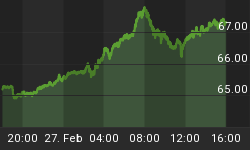-
Germany requested that the NY Federal Reserve return the gold that Germany shipped to the United States decades ago. If the gold were physically in the vaults, it would be relatively simple to ship the gold back to Germany. It has not been returned, which begs the question, where is Germany's gold?
-
If Germany's gold is "missing" what about other gold from other countries that is supposedly stored at the NY Fed?
-
Does the U.S. gold supposedly stored at Fort Knox and at the NY Fed still exist in those vaults?
-
The U.S. believes in paper dollars and an unbacked debt based currency. Such currency can be created with little more than a few keystrokes on a Federal Reserve computer. Would the Fed and the U.S. government sell gold into the world market to slow the inevitable weakening of the U.S. dollar? Would the Fed and the U.S. government ship (via intermediaries) substantial quantities of gold to China to prevent dumping of T-bonds and dollars? Are gold sales a "delaying action" to extend the reserve currency status of the U.S. dollar?
-
If China is converting their excess of dollars and T-bonds into gold, buildings, land, businesses, mines and so much more, what do they believe is the real value of those dollars and T-bonds?
-
If much of the German, Italian, French, English and U.S. gold is "missing" and is now in very strong hands, is the price of gold too low and likely to rise?
-
What will happen to world bond and stock markets if confidence in the financial system evaporates? Would confidence in the financial system be damaged if the world became aware that most of the gold supposedly stored in government and central bank vaults in the western world is "missing?" Is this the primary reason why the U. S. gold vaults have not been audited for over 50 years?
-
Why are China and Russia buying large quantities of gold from the western world as well as all of their domestic production?
-
Paper dollars were, years ago, backed by gold or silver. They are no longer backed by either. Why?
-
JP Morgan testified before congress in 1912 and stated, "Gold is money. Everything else is credit." Do you understand what this means?
-
You have $100,000 to invest today into either gold or S&P 500 Index ETFs. Which investment do you believe will purchase more gasoline in three years?
-
If you had $100,000 to invest into either gold or Confederate paper money and Confederate bonds in 1862, which would have been the better investment 20 years later?
-
Voltaire stated about 3 centuries ago that "paper money eventually returns to its intrinsic value - zero." Most paper money systems throughout history have failed. The current paper systems seem likely to fail in the future. What is the intrinsic value of 80 ounces of gold (about $100,000 at today's prices)? What is the intrinsic value of 5,000 $20 bills ($100,000)? Which seems likely to purchase more food in three years?
-
Mayer Rothschild supposedly stated, "Give me control of a nation's money and I care not who makes its laws." Was he thinking that if he can create the currency, and the legislature can be "influenced" with currency, then he can buy the legislation that his banking interests needed? Was he also thinking that if he can create the currency and he can trade that currency for physical gold, he had procured real wealth for his family?
-
Nixon closed the gold window in 1971 and assured us that it was only temporary. Since then the (official) U.S. national debt has increased from approximately $398 Billion to over $17 Trillion - up by a factor of over 40. Interest must be paid on that debt. Was the creation of $17 Trillion in debt beneficial for the majority of the people and the economy of the U.S., or only for the political and financial elite?
-
Is the current U.S. paper money experiment going to end differently from any other failed fiat currency system?
-
In 1971 gasoline in the U.S. cost approximately $0.35 per gallon. Today it costs approximately $3.50 per gallon. The rising national debt correlates with the rising prices of gasoline, tuition, health care, postage, coffee, stocks, gold, copper, rent, food, and so much more. Some of those prices have risen faster (others slower) than the debt, but the trend is the same since 1913 and especially since 1971 - all up substantially. Do you think this is a coincidence? Do you think the ongoing increase in national debt will continue to cause consumer price inflation or that it will, somehow, miraculously, cause prices to go down, in spite of 40 + years of contrary experience?
Conclusions
Is this the end of the world? No! But it is past time to realize that a debt based financial system is largely detrimental to most of the people outside the political and financial elite. Such a debt based system has a limited lifespan and a reset seems both imminent and inevitable. Actions to consider:
-
Eliminate non-mortgage debt and reduce the amount of other debt.
-
Convert variable rate mortgage debt to fixed interest rate debt.
-
Be wary of a stock market that has risen for almost five years and seems to be based more on QE, hope, and artificially lowered interest rates than upon earnings and the health of the economy.
-
Convert paper and digital dollars to gold and silver and store them in a safe depository outside the banking system.
-
Be careful in this increasingly dangerous world.
Suggested Reading:
Now Is The Time To Buy Gold
Inflation Will Take Precious Metals Much Higher
European Bail-In Commentary
Gold Investors: Take the Red Pill















